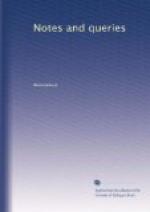Haberdasher—Martinet.—Can any of your correspondents suggest an etymology for the word haberdasher? I ought, perhaps, to say that I am acquainted with the derivations propounded by Mr. Richardson, but consider them all unsatisfactory. While on the subject, I would also ask if Mr. Richardson’s Dictionary is considered the best {168} source extant of information on English etymology, because I cannot help thinking that it has very many faults and deficiencies. The very word, for instance, on the derivation of which your valuable correspondent MR. FORBES offered a suggestion in No. 38., viz. Martinet, I had in vain sought for in Mr. Richardson’s Dictionary, at least in his quarto edition, 1887.
PRISCIAN.
* * * * *
“Querela Cantabrigiensis.”—Is anything known of the authorship of the Querela Cantabrigiensis: or, a Remonstrance by way of Apologie for the banished Members of the late flourishing University of Cambridge. By some of the said Sufferers. Anno Dom. 1647? This seems a favourable time for inserting this Query, as there is a chance of a second series of “The Universities’ Complaint" making its appearance before the year is out.
J.M.B.
* * * * *
Long Lonkin.—Can any of your readers give me a clue to the personality of Long Lonkin, the hero of a moss-trooping ballad popular in Cumberland, which commences—
“The Lord said to his ladie,
As he mounted his horse,
Beware of Long Lonkin
That lies in the moss.”
And goes on to tell how Long Lonkin crept in at “one little window” which was left unfastened, and was counselled by the wicked maiden to—
“Prick the babe in the cradle”
as the only means of bringing down the poor mother, whom he wished to kill.
Are there any other traditions of him, and can he have any connection with the name bestowed by children on the middle finger, in the following elegant rhyme?—
“Tom Thumbkin,
Will Wilkins,
Long Lonkin,” &c.?
This I had always supposed merely to refer to the length of the finger, but the coincidence of names is curious.
SELEUCUS.
* * * * *
REPLIES.
TREATISE OF EQUIVOCATION.
I can now inform you that the MS. Treatise of Equivocation, about which J.M. inquired (Vol. i., p. 263.), is preserved in the Bodleian Library (Laud, Miscellaneous MSS. 655.). Dodd, in his Church History (vol. ii. pp. 381. 428.), under the names Blackwell and Francis Tresham, mentions the work by its second title, A Treatise against Lying and fraudulent Dissimulation, and states that the MS. is in the Bodleian. Through the kindness of Dr. Baudinel,




